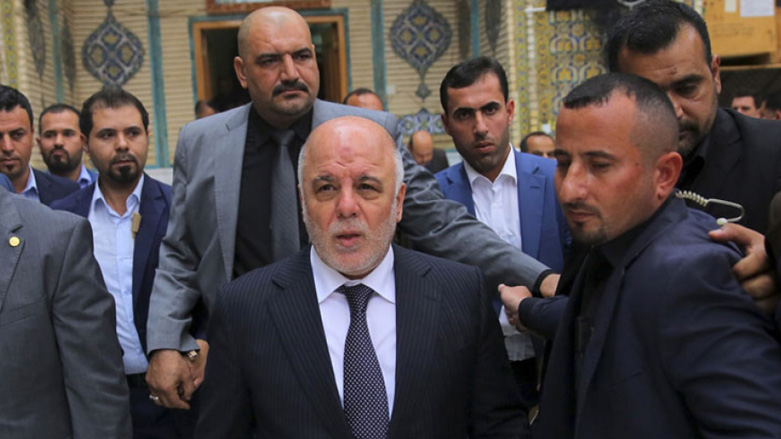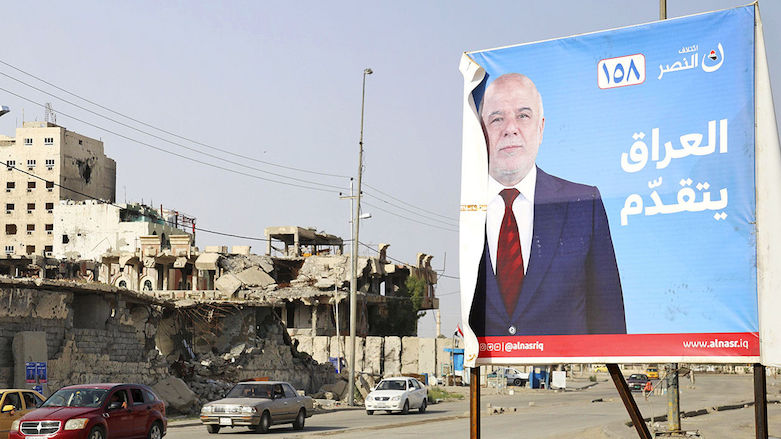Abadi’s dismal showing and a US gamble that failed

WASHINGTON DC (Kurdistan 24) - Now that preliminary results have been announced for Saturday’s parliamentary elections in Iraq, the lack of support among Iraqis for Prime Minister Haidar al-Abadi is evident—despite extensive US efforts to portray him as an Iraqi hero and secure his election.
That effort failed dismally—although Abadi had the advantage that an incumbent enjoys. This journalist repeatedly heard from Iraqis, Kurdish as well as Arab, that Abadi was not a popular figure. That is what the election results now reveal.
In the last parliamentary elections, in 2014, Abadi won only 4,000 votes. That is not enough to secure a seat in parliament, which requires 30,000 votes. However, Iraqi election law allows another candidate to “give” his excess votes to other members of his list.
In 2014, Iraqi Prime Minister, Nuri al-Maliki, won a record 700,000 votes and shared them with others on his “State of Law” list, including Abadi. However, the Islamic State (IS) suddenly emerged, seizing one-third of Iraq.
Washington forced Maliki, a sectarian figure, to step down in favor of Abadi, as a condition for its support against IS.
That is how Abadi became prime minister, even as he won only a small number of votes—which would not have secured his election as mayor of a major city, let alone prime minister of a country.
The results of Saturday’s election reflect that. It is being reported that Abadi came in third, behind the list of Muqtada al-Sadr, the firebrand cleric, who opposed the US during the Iraq war (2003-11), as well as the list of the pro-Iranian Shiite militias, initially mobilized to fight IS, but which are now assuming a permanent role in Iraq’s political and military fabric, somewhat like Hezbollah in Lebanon.
However, saying that Abadi came in third does not capture the breadth of his electoral loss.
In Baghdad, capitol of the country and its most populous province, Abadi’s Al-Nasr (“Victory”—i.e. over IS) list came in fifth. Sadr’s Al-Sairoon (“Marching”—i.e. toward reform) was first, followed by the list of the pro-Iranian Shiite militias, Al-Fatih (“Conquest.”)
Throughout the Shiite south, something similar was repeated: Al-Fatih or Sairoon was number one or number two, and neither fell below that. Abadi’s party consistently trailed behind those two parties at number three, or even number four.
Only in Mosul Province did Abadi win a respectable showing. There, he was number one, edging out the Kurdistan Democratic Party (KDP) by some 3,000 votes (in a province that is not even part of the Kurdistan Region!)
Otherwise, throughout Iraq, number three was Abadi’s best showing.
Yet for the better part of the past year, the US has consistently twisted its position in ways that it thought would promote Abadi and secure his election.
The US avoided publicly criticizing Abadi. It avoided mention of Iran’s strong and growing influence in Iraq during his tenure as prime minister.
And, above all, the US accepted Abadi’s assault on Kirkuk last October—although the attack involved the Iranian-backed militias and was engineered by Qasim Soleimani, head of the Quds Force of Iran’s Islamic Revolutionary Guard Corps.
Abadi was portrayed, by the US, as the strong-man who had preserved Iraq’s unity.
That, however, did not convince Iraqis to vote for him. As one informed Washington DC source advised Kurdistan 24, the US recognized already before the elections, in the last few weeks, that Abadi might not win.
“Yet they nearly sacrificed the whole of the Kurdish region,” he continued, “for the sake of promoting Abadi’s election chances.”
That was, truly, a gamble that failed. But it still leaves a question: why didn’t US officials see that coming, months ago?

